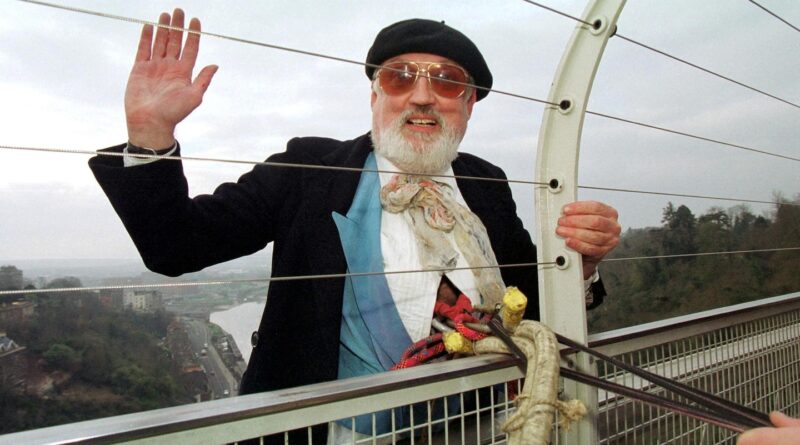David Kirke, first bungee jumper and extreme sports patriarch, dies at 78
Or the time he flew over the English Channel standing in the pouch of a giant inflatable kangaroo held aloft by helium balloons.
Mr. Kirke was the founder of the Dangerous Sports Club, a group of University of Oxford students who, typically while not sober, hatched deranged stunts in English pubs during the 1970s and ’80s, often as a metaphorical middle finger to Prime Minister Margaret Thatcher’s society of squares.
“Most people think we are mad,” Mr. Kirke once said. “We think they’re mad to endure such humdrum lives.”
Decades before extreme sports such as bungee jumping, kiteboarding and wingsuit flying became mainstream, Mr. Kirke and his coterie of foolhardy mates were skiing down Swiss slopes on grand pianos, skateboarding (not running) with the bulls in Pamplona, and flying makeshift microlight gliders across imprudent distances.
After one of Mr. Kirke’s flights unexpectedly terminated in her yard, a woman in Surrey told reporters: “I heard a terrible rumpus and then all I saw were these legs in jodhpurs hanging out of my tree. He was very apologetic. He was going to Paris I believe.”
Some of the club’s long-ago antics today look a lot like the television show “Jackass,” in which actor Johnny Knoxville orchestrates ostensibly hilarious and grotesque stunts. But Mr. Kirke had no desire to capitalize on pop culture’s hunger for spectacle, nor did he care about fame or money.
The Dangerous Sports Club, to him, was “one-third recklessness of innocence, tempered with two-thirds recklessness of contempt.”
“What we hated was the way that formal sports had all these little, important bourgeois instructors saying, ‘You’ve got to get through five-part exams to do this,’” Mr. Kirke told Vanity Fair. “ … We’re interested in new things. You make a fool of yourself, your girlfriend leaves you, you lose money, but you may have advanced things a tiny little half-inch.”
The idea to bungee jump was inspired by a television story about men in the Pacific island nation of Vanuatu jumping from platforms with vines attached to their legs to prevent their skulls from hitting the ground. Mr. Kirke substituted elasticated rope.
After a night of drinking with club members, he jumped off the Clifton Suspension Bridge in the city of Bristol without testing whether the rope could hold his weight.
“We were called the Dangerous Sports Club, and testing it first wouldn’t have been particularly dangerous,” he told the Bristol Post. “I was confident though.”
Several members went after him — Mr. Kirke always went first on new stunts — and they spent the night in jail. Six months later, he and other members bungee jumped from the Golden Gate Bridge in San Francisco, earning them more time in custody.
As the years went by, most club members matured into marriages and became engineers, bankers and politicians. Mr. Kirke barely held a job longer than a bungee jump and relied on the generosity of friends and family members as an essential source of income. He drank an extraordinary amount of wine, including a bottle with his breakfast.
“You had to be quite careful in later years to invite him to lunch,” said Hugo Spowers, a former club member who is now an engineer developing hydrogen fuel cell cars. “He would be there in time for a 1 o’clock lunch, but you could never be quite sure when he was going to leave. It might be six weeks later.”
The eldest of seven children, David Anthony Potter was born Sept. 26, 1945, in Shawbury, a village in Shropshire, England. He later changed his last name to his mother’s maiden name, in part to project the family from press inquiries about his many stunts, according to stories in British newspapers.
Mr. Kirke’s father was a schoolmaster and his mother, a descendant of a distinguished military family, was a concert pianist. They vacationed in Switzerland and France and drove a vintage Rolls-Royce.
At Oxford, Mr. Kirke studied English, psychology and philosophy. After leaving the university — it was unclear what year he graduated — Mr. Kirke briefly worked in publishing before returning to east Oxford following the death of his girlfriend, who fell off the back of a London bus.
Mr. Kirke suffered serious injuries during his club days, including to his back. He also spent several months in jail on charges connected to unpaid debts and the use of a credit card that was not his own. Friends said he sold drafts of a memoir to several publishers but never finished it.
“That would have been a very brave lady,” Spowers said.
Mr. Kirke’s family confirmed his death, on Oct. 21, to several London newspapers. “He had, and needed, an iron constitution, led from the front and went where many feared to tread,” his family said in a statement.
Friends said Mr. Kirke died in a government-provided flat in Oxford filled with piles of pages from his unfinished memoir and photos of his many adventures. They are busy trying to collect the mess in hopes of preserving a record of the world he created for them.
“He wasn’t bound by the conventions that we all live by,” Spowers said. “He could be irritating and exasperating but being involved with him enriched all of our lives.”
Asked once how he wanted to be remembered, Mr. Kirke said, “In my obituary, I want it to say he gave things a good go.”
Phil Davison contributed to this report.
correction
A previous version of this article misstated Hugo Spowers’s last name on second reference. The article has been corrected.




